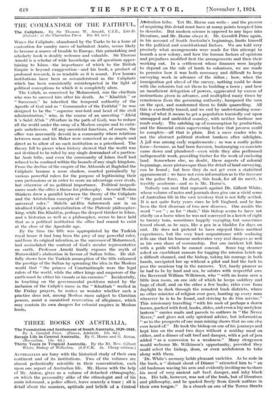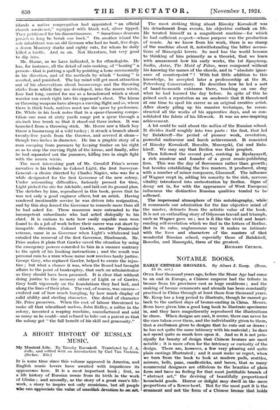THREE BOOKS ON AUSTRALIA:
Thirty Years in Tropical Australia. By the Rt. Rev. Gilbert White, Bishop of Willochra. (S.P.C.K. 58. Cheap edition.) AUSTRALIANS are busy with the historical study of their own continent and of its institutions. Two of the volumes are almost pedantically scientific in their concentration, each upon one aspect of Australian life. Mr. Horne with the help of Mr. Aiston, gives us a volume of detached ethnography, on which the personality alike of the ethnologist and of his main informant, a police officer, leave scarcely a trace .; all is detail-about tlie. manners, aptitude and beliefs' of a Cintral Australian tribe. Yet Mr. Horne can write : and the process of acquiring this detail must have at many-points tempted him to describe. But modern science is opposed to any lapse into literature, and Mr. Horne obeys it. Mr. Grenfell Price again, in his account of South Australia's beginnings, limits himself to the political and constitutional factors. We are told very precisely what arrangements were made for this attempt to launch a new colony, and how the human factors of opinions and prejudices modified first the arrangements and then their working out. In a settlement whose finances were largely to depend on the sale of lands to colonizers, we are made to perceive how it was both necessary and difficult to keep surveying work in advance of the influx ; how, when the immigration got ahez.d of the survey, nothing could be done with the colonists but set them to building a town ; and how an insufficient delegation of powers, aggravated by excess of instructions given in advance, and multiplied many times by remoteness from the governing authority, hampered the men on the spot, and condemned them to futile quarrelling. All this is excellently traced, and we end by understanding some- thing of what it means to get a population hurriedly out upon unmapped and undivided country, with neither harbour nor roads ready. The catching up of consumption by production, and the financial crisis supervening before that process could be complete—all that is plain. But a mere reader who is not the abstract political student hankers after sidelights. A jail was among early requirements ; so was a costly police force—because, as had been foreseen, bushranging ex-convicts came down and plundered—even while they also performed indispensable work, providing timber for the work 'of enclosing land. Somewhere else, no doubt, these aspects of colonial beginnings, more picturesque than the detail of land surveying, can be found ; but here they do not get even a statistical appraisement : we have not even information as to the increase in the police force. In short, this book, for all its merit, is terribly academic—and so is Mr. Horne's.
Nobody can cast that reproach against Dr. Gilbert White, whose volume of notes and journals does give one a vivid sense of Australian life in the vast territory that is not fully settled. It is not quite forty years since he left England, and he has been the first diocesan of two new dioceses. One avoids the word " see " ; as for " chair," this bishop seems to have sat chiefly on a horse when he was not conveyed in a ketch of eight to twenty tons, sometimes happily voyaging, but sometimes tossed about, as he says, like a pea in a bladder for days on end. He does not pretend to have enjoyed these nautical experiences, but the very least acquaintance with seafaring tells one that his humour underrates very real dangers as well as his own share of seamanship. But one incident left him with a pride which he cannot conceal. Some tug steamer asked an exorbitant ransom for tugging the mission ketch up a difficult channel, and the bishop, taking his courage in both hands, navigated her up without a pilot and had the luck to pass the usurious tug in the narrows. Yet, hardy pioneer as he had to be by land and sea, he salutes with respectful awe the Reverend William Wilkinson, who " with no home save a little iron room, on one side of which he keeps saddlery and bags of chaff, and on the other a few books, rides ever from daylight to dark through the remotest bush districts, where no other minister of religion ever goes, hunting up every man wherever he is to be found, and striving to do him service." This missionary travelling "with his mob of perhaps a dozen horses, packed with feed, books, slides, and even a big acetylene lantern " carries mails and parcels to outlaws in " the Never Never," and gives not only spiritual advice, but information " as to the prospects of one man mining shows that no one else ever heard of." He took the bishop on one of his journeys and kept him on the road two days without a midday meal on either, and a dinner of salt beef and damper, with a pot of jam added " as a concession to a weakness." Many clergymen would welcome Mr. Wilkinson's opportunity, provided they could select the bishop, dean, or even archdeacon to take along with them.
• Dr. White's memory holds pleasant varieties. As he rode in the bush, a " distant shout of Dinner " attracted him to " an old bushman waving his arm and evidently inviting me to share his meal of very ancient salt beef, damper, and inky black tea. His talk, however, was not of the bush, but of literature and philosophy, and he quoted freely from Greek"authiars in their own tongue." In a church on one of the Torres Straits islands a native congregation had appointed " an official church awakener," equipped with black rod, silver tipped. They petitioned for his discontinuance. ". Sometimes deacons preach so long he break our back." On another island the sole inhabitant was an old German who had no boat, five dogs, a dozen Muscovy ducks and eighty cats, for whom he daily killed a turtle. And so on. Not literature, but very good to dip into. •
Mr. Horne, as we have indicated, is -for ethnologists. He has, for instance, all the detail of rain-making, of "boning" a person—that is putting a spell by pointing a bone ceremonially in his direction, and of the methods by which " boning " is averted, and punished. The lay mind will get most attraction out of his observations about boomerangs and the throwing sticks from which they are developed, into the murra wirrie, four foot long, carried for use as a broadsword which a stout warrior can crash right into his opponent's chest. The kirras or throwing weapons have always a curving flight and so, where there is thick bush, natives must use the spear by preference. Dr. White in his book notes that in a spear-throwing compe- tition one man at sixty yards range put a spear through a six-inch tree trunk so that it stood out three inches. It was launched from a throwing stick. Mr. Horne saw a black boy throw a boomerang at a wild turkey ; it struck a branch about twenty-five yards from the thrower, and severed it clean— though two inches in diameter. He has a graphic story of a man escaping from pursuers by keeping timber on his right so as to stop the curving flight of the kirras, and finally, after he had separated out the pursuers, killing two in single fight with the murra wirrie.
The most interesting part of Mr. Grenfell Price's severe narrative is his tribute to Colonel Tight, the first Surveyor- General—a choice directed by Charles Napier, who was for a while designated for the first Governor of the new colony. Under astounding difficulties, furiously pressed for time, Light picked the site for Adelaide, and laid out its ground plan. The sketches by him, reproduced in this book, prove that he was not only a good engineer officer, but an artist. Having rendered inestimable service he was driven into resignation, and by this, step forced thaGovernor -to concede more than all he had asked for. These resources were entrusted to •the incompetent subordinate who had acted disloyally to his chief. It is curious to note how easily capable men were found to do a job of work before their career was cut short by incapable direction. Colonel Gawler, another Peninsular veteran, came in as Governor when Light's withdrawal had entailed the removal of the first Governor, Hindmarsh. Mr. Price makes it plain that Gawler saved the situation by using the, emergency powers- conceded to -him in'a manner contrary to the spirit of his limiting instructions ; and the result was personal ruin to arnan -whose name now receives tardy justice.' George Grey, who replaced Gawler, helped to create the injus- tice ; but what a chance it was, when the Board had brought affairs to the point of bankruptcy, that such an-administrator as Grey should have been procured. It is clear that without doing justice to the memory either of Light or of Gawler, Grey built vigorously on the foundations they. had laid, and along the lines of their plan. The end, of course, was success— evolved out of how much bungling, by how much display of solid ability and sterling character. One detail of character Mr. Price preserves. When the cost of labour threatened to make all that wheatland useless, John Ridley, a miller in the colony, invented a reaping machine, manufactured and sold as many as he could—and refused to take out a patent so that the colony got " the full benefit of his skill and generosity."











































 Previous page
Previous page